Dark Imperium Read online
Page 3
The atrium to the Heliopolis emerged suddenly from the unnatural dark. From its rear, the Phoenix Gate came at them like an ogre striding out of its cave in challenge. Guilliman had his men halt and spread out. The reports from the other strike groups crackled in his helmet, interrupted by hellish screams and moans, as – with sorrowful eyes – Guilliman took in what Fulgrim had done to the Phoenix Gate.
In the days before the war, the Phoenix Gate had been a masterpiece of the sculptor’s art. Together, the closed bronze gates had depicted the crowning moment of Fulgrim’s life.
The Emperor still stood there, holding out the palatine aquila to Fulgrim, whose figure also remained. The giving of this honour was the ultimate display of respect from their father, and the gate had been a reciprocal show of devotion from His son. Behind the two figures, a crowd looked worshipfully on.
In all other respects, the gate had changed.
The rich artwork was much abused. All over the soft bronze had been cut artlessly with profane symbols. The figures behind the two principal actors had been reworked into cavorting, lewd things of unnatural origin. The work was of variable quality. Some of it was executed with skill, other parts crude, and its inconsistency destroyed the careful illusion of depth its original sculptor had created.
Originally, the lesser figures had subtly drawn the eye to the principal actors of the piece; now these background characters clamoured for the eye’s attention, overwhelming the Emperor and His son.
Only Fulgrim’s Legion had been permitted to display the personal symbol of the Emperor. The irony of the honour weighed heavily on Guilliman’s heart. Fulgrim had been pompous, vainglorious, boastful and proud, but his better qualities had outshone these foibles.
Examining the wreck of the door’s art hardened Guilliman’s heart. The aquila’s eyes had been hacked out. The head of the Emperor had been gouged from the relief and replaced with a mess of bones lashed together with blackened sinew. Fulgrim’s face was now a moving mask of silver which shifted almost imperceptibly through a range of expressions, all of which were hateful variations on sneering arrogance. His body too had been changed, made multi-limbed and serpentine in a manner that suggested it had always been this way. It depicted him as a savage god, rich with potency, though it could not match the truth of his new form.
‘He will be within, waiting,’ said Guilliman, running his gaze over the vandalism one more time. He turned from the gates to address Thiel and Andros. ‘Await me here.’
‘My lord,’ said Thiel, ‘he undoubtedly is waiting for you – that is his way. All this showmanship appears childish, but he is dangerous. I remember how he was. By entering, you are playing into his hands. We should not play his petty games. We should go on in force and slay him.’
‘I go alone,’ said Guilliman firmly. ‘If we attack en masse, he will respond in kind and we will be driven back or destroyed before our brothers can complete their tasks. Let me occupy him. His arrogance will demand he gloat awhile. While he is engaged in pointless display, his attention is away from the others, and we will have the opportunity to disable the ship.’
‘He will want to fight you,’ said Thiel.
‘He will,’ agreed Guilliman.
‘He may ambush you,’ said Andros.
‘That is unlikely,’ said Guilliman. ‘He will want to prove he is better by feat of arms.’
‘He will kill you, my lord. Do not do this,’ said Thiel.
Guilliman stared back, his expression hidden by the muzzle of his helmet.
‘I must fight him.’
‘Do you truly believe you can beat him?’ asked Thiel.
‘I do not know,’ answered Guilliman after a pause.
Thiel looked away and sighed. His helm rendered it as a growl. ‘I fear there is more to your desire to face your brother than practicality, my lord.’
‘What do you mean by that?’
The ship trembled as a heavy hit burst its way inwards, perturbing the unnatural serenity of the craft.
‘Pride doomed your brother,’ said Thiel simply. ‘Pride undoes the mightiest. Do not be proud, my lord.’
‘Are you not proud, my son?’
‘I am proud,’ said Thiel. ‘To be Ultramarine, to have you as my gene-sire, to have fought with you for so long. But I am not proud enough to let it kill me.’
Guilliman smiled beneath his helmet. ‘You have not changed, Aeonid. Fear not – I will not let pride doom me. Stand aside but for the moment. Guard my back. If I cannot best Fulgrim alone in combat, come when I call and we shall give him the honourless death he deserves.’
‘My lord,’ said Thiel, relieved.
‘It will be so,’ added Andros.
Reluctantly, the sons of Roboute Guilliman stood away from the doors. The primarch placed his palms flat upon their defiled metal and pushed. He expected them to creak and squeal, but they opened soundlessly, emitting a gust of foul-smelling air as they parted. Nothing but darkness was beyond, closer yet than that in the Triumphal Way.
Guilliman entered the Heliopolis, and the gates swung closed behind him.
Chapter Three
The Fallen Phoenix
The Heliopolis was in a ruinous state. Shattered tiers of marble seats crowded the dark. In times past, the followers of Fulgrim had gathered upon them to hear their primarch speak, before he fell to darkness and took his Legion with him. Now, pageantry and light had been cast out by decay and dereliction. The great windows in the dome were dark, their shutters closed from neglect rather than by necessity. A thick layer of dust coated everything, and the air reeked thickly of sweat and stale musk.
Bones were scattered about amid toppled fire bowls. They were mostly baseline human, but here and there were the skeletons of Space Marines, identifiable by their greater size, the solidly fused bones of their ribcage and the tattered remains of black carapace clinging to them. Shell holes in the marble told of a battle long ago. The craters’ large circumferences had the signature blast patterns of bolt detonation in soft stone: Space Marine had fought Space Marine here, though when and why, Guilliman could not guess. Perhaps there had been a last stand of Emperor’s Children loyal to Terra, though it could just as easily have been a clash between rival warbands decades later. It was impossible to tell.
The mosaics on the ceiling were full of holes, the faces all smashed in. Hooks between the figures held bent banner poles. Shreds of triumphal silk standards moved in the ship’s breath. When whole, these flags had proudly commemorated thousands of victories in the Emperor’s name, but now they were as spoilt as the oaths of the warriors who had won them. A rare complete example stood out amid the rags. The devices on it were smirched with filth. That was worse, in a way.
Silence made the Heliopolis its domain. Vox reports chattered in Guilliman’s helm, telling of goals almost accomplished, and bringing the clamour of war into the dead auditorium, but the racket was contained by his helmet. The silence was stronger, pressing in hard upon his ceramite faceplate and distancing Guilliman from the men fighting in his name.
At the centre of the Heliopolis was a ring dominated by a black throne. Guilliman recalled standing there beside his brother and speaking in the days when all this madness was inconceivable. A cone of soft light ignited and fell onto it, casting shadows from chunks of rubble and bringing an eerie shine from the black terrazzo of the flooring. Guilliman descended the steps slowly from the Phoenix Gate, down the main stairs whose once shining finish had been scratched dull.
The battle cries of the Aurora Chapter, the war oaths of the Novamarines and the howling of the Doom Eagles all echoed in his helmet. A burst of loud static signalled an explosion. A signifier rune in Guilliman’s helm blinked green – the Aurora Chapter had knocked out the ship’s navigatorium. Garbled reports from their captains competed with the other incoming traffic, ecstatic with hard won victory, signalling their withdrawal
. He overheard jubilant calls for teleport lock, and then they were gone.
Other signifiers glowed dull red around the top of his faceplate display, representing his strike teams’ remaining targets. Two more critical systems, two more green runes, and they might escape this yet, but his men needed more time.
‘Continue with your objectives, my sons.’ He spoke clearly into his vox pick up. ‘Fall back upon their completion. The Emperor watch over you.’
He cut his vox. The Heliopolis’ malevolent silence rushed into his helmet.
Guilliman reached the last step and paused at the edge of the inner circle. The last of his heavy footsteps echoed to nothing. The light was unclean, some warp effect obscuring the far side of the Heliopolis from his vision. He was vulnerable here. This was the stage his fallen brother had chosen for their final confrontation: the derelict site of Fulgrim’s lost glories.
‘Fulgrim! I am here. Fulgrim! Your brother, Roboute Guilliman, stands in the Heliopolis again. Will you not greet me?’
Guilliman’s vox-amplified voice echoed around the Heliopolis, each repeat growing with sadness until it became a sobbing caricature.
The effect disappointed Guilliman. ‘My once brother, your cheap sorcery cannot upset me. Come out and face me, if you dare, or have you become as cowardly as you are debauched?’
There was a metallic rattle, and a rasping of scaled skin over stone that echoed around the outer row of seats. Guilliman squinted, but the light before him cheated his vision, allowing him to see only into the circle.
‘I hear you, Fulgrim!’ he cried. ‘Come out into the light!’
This time, Fulgrim replied. His voice was as mellifluous as it always had been, but the neediness that had always lurked at the back of his words had come to fore, a poison masquerading as confidence.
‘Why are you in such a hurry?’ he said, his whisper filling the Heliopolis. ‘Your strategy is to play for time, is it not? To allow your sons in their fine new paints to cripple this ship. They look so colourful now, Guilliman, so much less dull than blue, blue, blue. How was it to break up your Legion, Guilliman? Did it hurt?’
‘Come and face me. Let us settle our differences honourably.’
‘Do you want to talk?’ Fulgrim, still unseen, tittered. ‘About what? A little family reunion? You and I have nothing in common. We never did, and now we have even less. I serve the true powers of this universe, while you languish under the dead hand of our father. You are so predictable, Roboute.’ He laughed. ‘So dull, so stolid. Boring old Roboute! You were the unloved child, while the brighter stars got all of father’s attention. Overlooked, until the end, and then when you were needed you were not there. It must have stung, brother, to be so outshone. Perturabo did not enjoy it, I know. Did you?’
Guilliman peered hard through the light. It responded to his prodigious will, its obscuring effect lessened, and he caught a hint of sinuous movement on the far side of the circle.
‘Our father honoured me always,’ shouted Guilliman across the empty chamber.
Fulgrim laughed, louder and louder until the Heliopolis filled with wild mirth that seemed to issue from a thousand throats. ‘Oh, forgive me! That is so precious. Do you not remember my eagle, dear Roboute? It was I who was honoured, not you.’
The rasping of scales drew closer. Luminous green eyes glinted on the other side of the inimical light. Guilliman set himself and stood tall.
‘My Legion may not have won your plaudits, Fulgrim, but I chose the slow and steady road, and that was the better way. You were always racing toward perfection, away from your fear of failure. Your fear made you run right into the arms of damnation.’
‘Failure?’ Fulgrim scoffed. ‘Damnation? I have not failed! I am not damned!’ Fulgrim slithered into the light. ‘I am saved.’
‘For the love of Terra…’ whispered Guilliman.
Guilliman had seen pict-captures of his brother from the siege of the Imperial Palace on Terra. He had viewed them many times, noting the changes wrought upon his sibling as dispassionately as he could, fighting back the revulsion he felt at the sight. Reports and the occasional image of his sibling had surfaced from his reavings since. The image on the Phoenix Gate had been no surprise. He knew what to expect, but faced with Fulgrim in the flesh, he struggled to contain his dismay.
The Phoenician’s legs were gone, replaced with a long serpent’s tail. His torso and face had become elongated, his chest altered to accommodate an additional pair of arms. Despite his obscene form, everything was weirdly perfect. The muscles in his bare chest were exquisitely defined. His skin was a gorgeous shade of lilac. The snakeskin of his lower half shone with jewelled colour, and he moved with grace to shame the aeldari. But all this was a perversion of his former beauty, if not of the very idea of beauty itself. It was too much, so perfect in its awful twisting of the human form that it went beyond the ability of the mind to process. Fulgrim’s new shape provoked revulsion by its very nature, while awing with the artfulness by which it had been done. By design, he was made to arouse and repulse equally.
His head in particular was changed, long and crowned with horns that rose crimson from his shock of white hair. His face, however, remained his own, a sickening joke to crown his dark transcendence. Seeing the features of his brother melded to this monster brought tears to Guilliman’s eyes.
Finely wrought ornaments jangled on Fulgrim’s limbs. Soft leather straps held long gloves in place on his right arms. The left arms were painted with delicate patterns, his fingers hung with chains and their nails stained clashing shades. Vile sigils decorated the buckles of his harness. More were tattooed upon his skin.
Fulgrim rose up on his banded tail, holding his four arms wide in the sickly light of the Heliopolis.
‘Behold, my brother. See! What the Emperor made, the Prince of Pleasure has improved upon. Am I not perfection? I was made to be a slave, but now I am free, and the companion to a greater god than our father can ever be.’
‘The Emperor is not a god,’ said Guilliman.
The ship quaked. A signifier in Guilliman’s helmet turned from red to green. The portside void generators had been disabled. Datascreed informed him the Fourth Company of the Iron Snakes was making a fighting withdrawal.
‘Do you still believe that?’ said Fulgrim. He inched forwards, swaying hypnotically. ‘He always did protest too much about that. You think I am a traitor, I know. You think I am selfish, and deluded, but no more so than dear, dear father. He gave me so much, not least a taste for treachery.’
Fulgrim leaned closer, close enough for his hot, perfumed breath to caress Guilliman’s armoured face. The cloying stink of it penetrated his breathing grille, making him gag. There was a scent of something rotten beneath the melange of spices, one note of decay in a bouquet of opulence.
There is the truth, thought Guilliman. The miasma of corruption, a murdered corpse hidden in a bed of flowers.
‘Join with me,’ said Fulgrim seductively. ‘You must be tired of all this strife. We can bring an end to war, and revel together in sweet excess for all eternity. I can show you things, pleasures, you would never have dreamed existed. You think of the warp as a hell, but it can be a heaven also. Together, we can usher in an age of delight for all mankind that will never end.’
‘Never,’ said Guilliman. ‘You have been deceived. I will not follow you into darkness.’ He stepped backwards, his hand going to the hilt of the Gladius Incandor. The primarchs were mighty beings and great in stature, but swollen with the power of Chaos, Fulgrim overtopped Guilliman by almost a metre.
‘It is you who has been deceived, Roboute,’ said Fulgrim.
‘Look at what you have become, and you will see the wages of disloyalty.’
‘You speak to me of loyalty.’ Fulgrim tutted and shook his long warped head. ‘And where do your loyalties lie, lord commander? You were late to the Palace, were you
not? Delayed. Always, your love for your own kingdom trumps your so-called loyalty to our father. Like a little Emperor, playing at being daddy in the sand, making tiny empires. You would have saved the Five Hundred Worlds and lost the million of our father. Pathetic.’ A long, forked tongue flitted over his painted lips. ‘How are your Five Hundred Worlds now, brother? How many are left? Four hundred? Three? I hear Angron and Lorgar had a rare time bringing down the bastions of your puny realm and slitting the throats of your people.’
Guilliman’s anger ran hot. ‘I will not bend my knee to your masters. These gods you and the others profess to worship are not gods. They are monsters, nothing more. There can be no rapprochement between us. No reconciliation. You have become the tool of the enemy, and so I must kill you.’
‘You have come to kill me? Really? How amusing, because I have come to kill you!’ said Fulgrim with mocking surprise. He clapped his upper pair of hands. ‘What a coincidence. You do realise, I need no starship to travel the void.’ He gestured at his body, his four hands moving with obscene, suggestive precision. ‘I am no longer a thing of this realm of ash and dust, but a radiant creature of the warp.’ He pulled a moue of sympathy. ‘Oh, I am so sorry, but this was a trap for you, Roboute – the whole thing, from my first raids to your supposed victory at Xolco, and you have fallen into it.’
Since the first indication of Fulgrim turning to fight here, Guilliman had known he had been outplayed, but he would not give his brother the satisfaction of knowing this. He steeled his heart and prepared to fight.
‘I will not be turned.’
‘I never thought you would,’ said Fulgrim sweetly.
Another shudder passed up the Pride of the Emperor. The rune denoting the strike against the enginarium turned green. Corvo would be pulling his Chapter back.
‘You can run now, if you want,’ said Fulgrim. ‘I believe your warriors have accomplished what you sent them to do. This vessel cannot pursue you. Some of you might even live. I do not care. All of you will bow before Slaanesh before the end.’

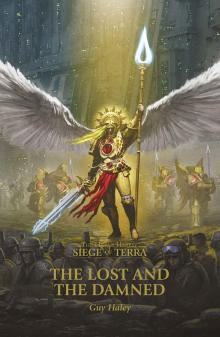 The Lost and the Damned (The Horus Heresy Siege of Terra Book 2)
The Lost and the Damned (The Horus Heresy Siege of Terra Book 2)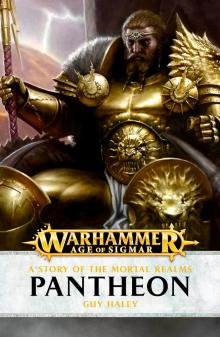 Pantheon
Pantheon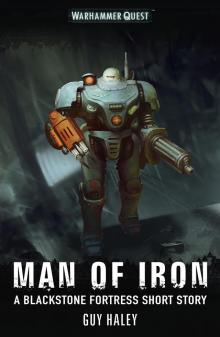 Man of Iron
Man of Iron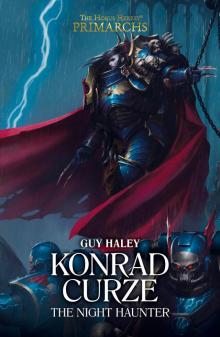 Konrad Curze the Night Haunter
Konrad Curze the Night Haunter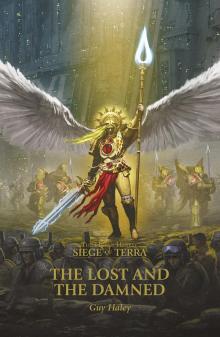 The Lost and the Damned
The Lost and the Damned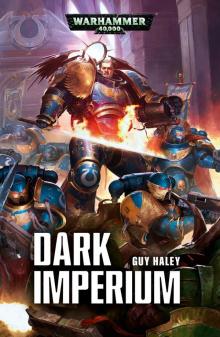 Dark Imperium
Dark Imperium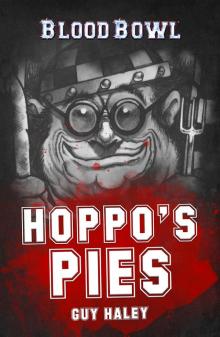 Hoppo's Pies
Hoppo's Pies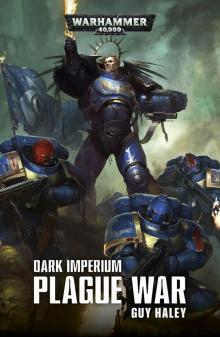 Dark Imperium: Plague War
Dark Imperium: Plague War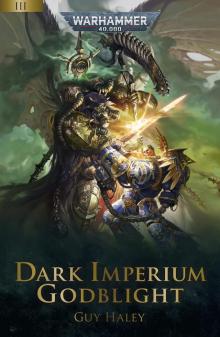 Dark Imperium: Godblight
Dark Imperium: Godblight Crash
Crash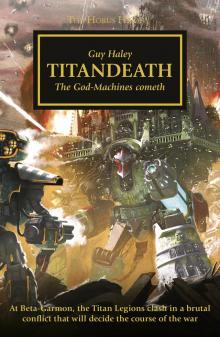 Titandeath
Titandeath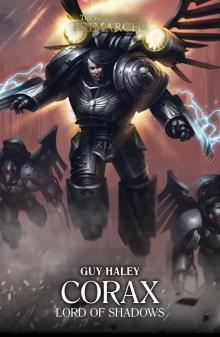 Corax- Lord of Shadows
Corax- Lord of Shadows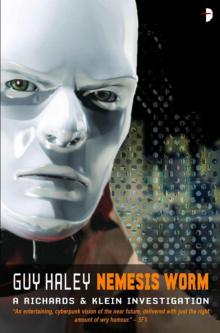 The Nemesis Worm
The Nemesis Worm Wolfsbane
Wolfsbane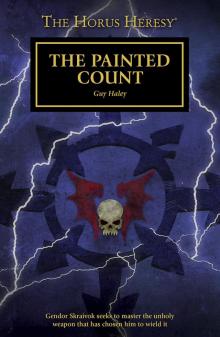 The Painted Count
The Painted Count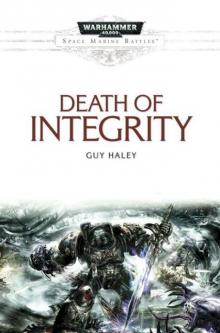 The Death of Integrity
The Death of Integrity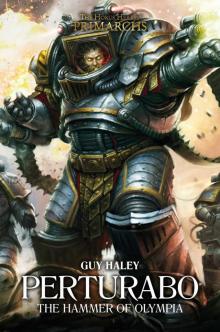 Perturabo: Hammer of Olympia
Perturabo: Hammer of Olympia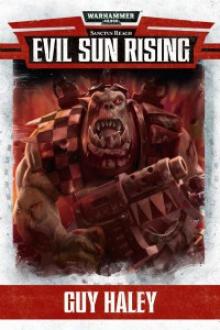 Evil Sun Rising
Evil Sun Rising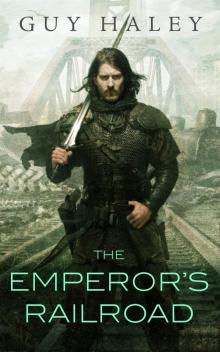 The Emperor's Railroad
The Emperor's Railroad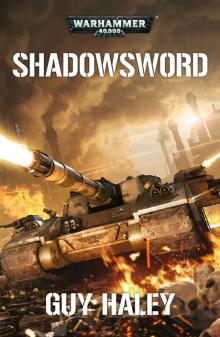 Shadowsword
Shadowsword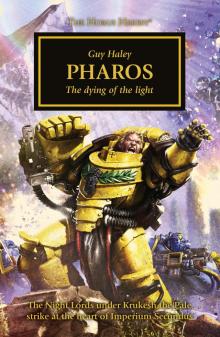 Pharos
Pharos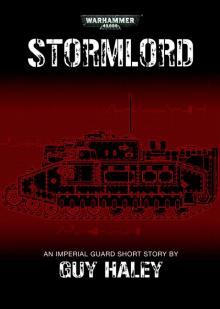 Stormlord
Stormlord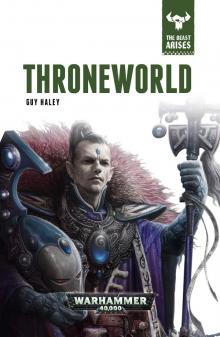 Throneworld
Throneworld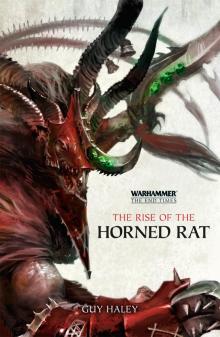 The End Times | The Rise of the Horned Rat
The End Times | The Rise of the Horned Rat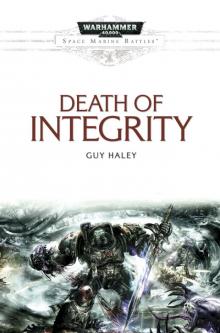 Death of Integrity
Death of Integrity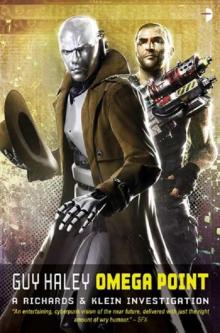 Omega Point
Omega Point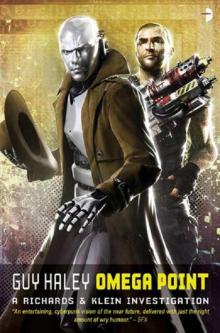 Omega point rak-2
Omega point rak-2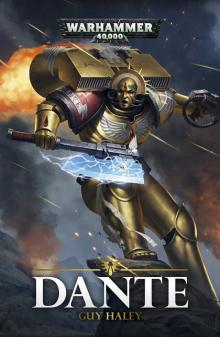 Dante
Dante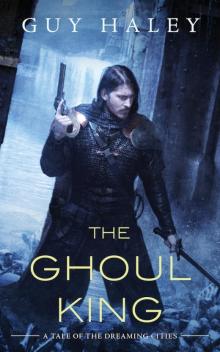 The Ghoul King
The Ghoul King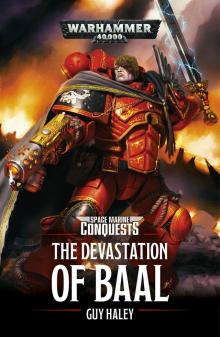 The Devastation of Baal
The Devastation of Baal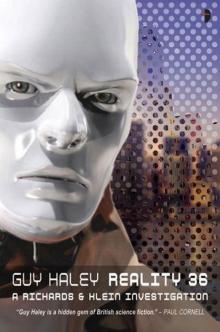 Reality 36: A Richards & Klein Novel
Reality 36: A Richards & Klein Novel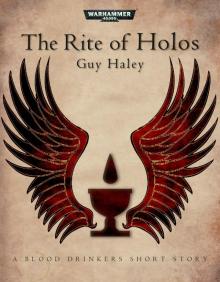 The Rite of Holos
The Rite of Holos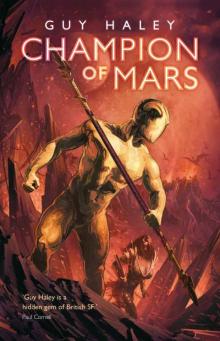 Champion of Mars
Champion of Mars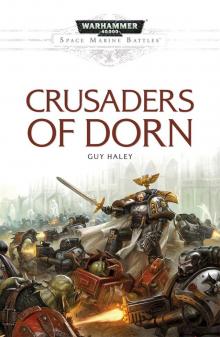 Crusaders of Dorn
Crusaders of Dorn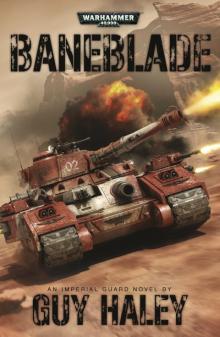 Baneblade
Baneblade